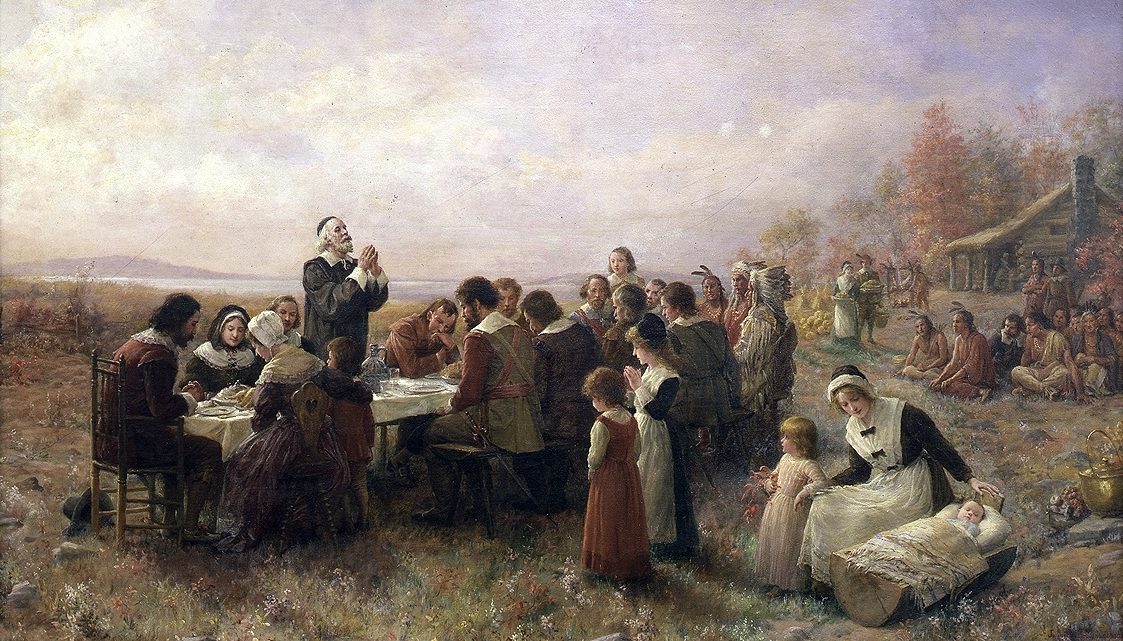Increasingly we’re told the Thanksgiving day is not something we should be celebrating. It was the beginning, some say, of genocide and theft of land that left Native Americans in the terrible situation they are in today. Without doubt, some terrible things happened. The absolute worst, in my opinion, was Andrew Jackson’s relocation of the Cherokee nation. Unlike some of the other things that happened, it was all one-sided, totally inexcusable. And there were great many injustices committed against Native Americans.
But to say that Thanksgiving Day was the beginning of such things, or that it celebrates white supremacy, is simply false. I know, how dare I say that? After all, to look at me, I’m about as white as a person can be. I get a sunburn in front of an open refrigerator. But, as it happens, my paternal grandmother was about one quarter American Indian. Growing up, I always asked my father what type of Indian we were. I thought of it as a badge of honor. My dad would always look at me and say, “Wild Indian.” I suppose I was as active as most boys.
Looking at my father, his Indian heritage was pretty clear. Unlike me, his skin had a slightly darker hue, and when he tanned his skin turned a deep brown. I, of course, inherited my mother’s skin. Her maiden name was Rose, of British heritage, with the characteristic pale skin.
Although some of my ancestors came to these shores very early, if I had any direct relatives at that first Thanksgiving day feast, they were among the Native Americans. But frankly, none of that matters. What matters are the historical facts, in this case, what were they really celebrating on that day?
Christians are instructed to give thanks, not only in times of peace and plenty, but “In everything give thanks; for this is the will of God in Christ Jesus for you.” 1 Thessalonians 5:18
The European settlers were celebrating the simple fact that they had survived, and had a reasonable harvest that year. When I say they had survived, it’s important to understand that half of those who had settled the year previous had died during the winter. One half. They were also celebrating, as were the Indians who came, the fact that they were living in peace with each other.
Those present on that first Thanksgiving day recognized that, at any time in Earth’s history, to be alive, to have enough to eat, and to be at peace with your neighbors was a rare event — and one with celebrating!
They were alive, had enough to eat, and were living in peace. Critics will tell you that peace did not last long, and they are right. But then, they could have pointed to almost any period in history, in any place, and made exactly the same statement. I doubt of either the pilgrims or the Native Americans had any illusions that the peace they experienced at that time was permanent. It never had been. For thousands and thousands of years, conflict, disease, starvation, and sudden death were the fate of mankind.
It is become fashionable today to dwell on one’s oppression, or on the oppression of others. Relieving oppression is indeed a Christian concern; rehearsing it and dwelling on it is not.
This was true in Asia, in Africa, in Europe, and in the Americas. Always there are some who want to live in peace, and always there were those who refused to let them. Periods of relative peace have been few and far between. I’m saying, “relative peace,” because during the famous Pax Romana, the “Roman Peace,” Rome was involved in nearly constant warfare somewhere on its frontiers. The relative peace was within the Empire, and if you read the book of Acts, you will remember that Paul and his companions were often the subject of beatings and riots — all within the “peaceful” confines of the Empire. Peace anywhere, anytime, is rare.
Contemporary Americans may be ignorant of that, but those present on that first Thanksgiving day were not. They recognized that, at any time in Earth’s history, to be alive, to have enough to eat, and to be at peace with your neighbors was a rare event — and one with celebrating!
Yes, wars would follow. Terrible things would happen. But not on that day.
Christians are instructed to give thanks, not only in times of peace and plenty, but “In everything give thanks; for this is the will of God in Christ Jesus for you.” 1 Thessalonians 5:18. Not “for” everything, but “in” everything. Had the participants in that first Thanksgiving wanted to dwell on negative things, both parties had plenty to grouse about. As mentioned, one half of the European settlers had died during the previous winter. And over several years prior, disease had taken a similar toll on many of the Indian tribes.
They could’ve found plenty to be angry about, plenty to be sad about. They probably could even found something to fight about. But they — both sides — chose not to do that, chose instead to be thankful. Thankful for their day, their moment, of peace and plenty.
It has become fashionable today to dwell on one’s oppression, or on the oppression of others. Relieving oppression is indeed a Christian concern; rehearsing it and dwelling on it is not. And giving thanks, as we have seen, is the will of God concerning us.
So yes, I happily celebrate Thanksgiving Day. I am mindful of the terrible things that happened after that day, and also of the many terrible things that happened before that day, as were the original participants. But each Thanksgiving Day that I find myself alive, in the company of those I love and care for, and with enough to eat, I will celebrate those facts, and celebrate the vision and gratitude of that first gathering, nearly 400 years ago.









